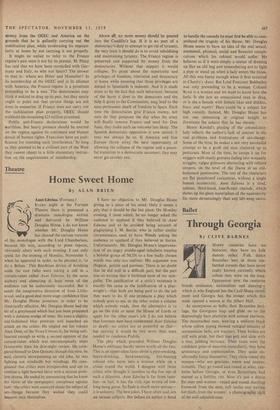Theatre
Home Sweet Home
By ALAN BRIEN Aunt Edwina. (Fortune.) EVERY night at the Fortune Theatre there is presented a dramatic monologue written and delivered by William Douglas Home. I do not know whether Mr. Douglas Home has cleared the various versions of his monologue with the Lord Chamberlain, because his text, according to press reports, obviously alters with each evening. I can only speak for the evening of Monday, November 9, when he appeared in order. as he phrased it, to do a Behan.' This Brechtian device of brushing aside the cast (who were taking a call in a curtain-raiser called Aunt Edwina, by the same author) and alienating at least some of the audience can be audaciously successful. But it needs the imaginative direction of Joan Little- wood, and a good deal more stage confidence than Mr. Douglas Home possesses, in order to be theatrically effective. Mr. Douglas Home had the air of a greyhound which had just been presented with a dubious wodge of meat. He wore a slightly old-fashioned blue pinstripe and launched an attack on the critics. He singled out for rebuke Alan Dent, of the News Chronicle, for being soft- hearted enough to write a second opinion of the curtain-raiser which was microscopically more favourable than his first-night review. He com- pared himself to Don Quixote, though this time, he said, cleverly incorporating an old joke, he was fighting not windmills but windbags. He com- plained that critics were irresponsible and apt to confuse a light-hearted farce with a serious prob- lem drama. He ended by announcing that he knew the secret of the newspapers' conspiracy against him—the critics were annoyed about the subject of sex-change because they wished they could become men themselves. I have no objection to Mr. Douglas Home giving us a piece of his mind. Only it seems a pity that it should be the last piece. On Monday evening, I must admit, he no longer asked the audience to applaud if they believed in Aunt Edwina and so he avoided being accused of plagiarising J. M. Barrie, who in rather similar circumstances used to have Wendy asking the audience to applaud if they believed in fairies. Unfortunately, Mr. Douglas Home's impersona- tion of an angry middle-aged subaltern treating a bolshie group of NCOs to a few badly chosen words was only too realistic. His argument was illogical, pettish and partisan. There is no doubt that he did well in a difficult part, but the part was so written that it forfeited most of my sym- pathy. The justification of a critic's existence is exactly the same as the justification of a play- wright's--that both are being paid to do the job they want to do. If one produces a play which nobody goes to see, or the other writes a column which nobody reads, then the alternative is to go on the dole or enter the House of Lords or apply for the other man's job. I do not believe that fourteen men have condemned Aunt Edwina to death—no critics are as powerful as that— but anyway it would be two more than were needed to condemn Podola.
The play which preceded William Douglas Home's soliloquy hardly seems worth all the fuss. This is an upper-class farce about a pipe-smoking, heavy-drinking, hard-swearing, fox-hunting colonel who turns into a woman while on a cruise round the world. I disagree with those critics who thought it tasteless to dig fun out of such a dilemma. Aunt Edwina is far from taste- less—in fact, it has the rich, ripe aroma of too- long-hung game. its fault is much more serious— it is unfunny. The best jokes. I have often said, are on serious subjects. But before an author is fitted to handle the comedy he must first be able to com- prehend the tragedy of his theme. Mr. Douglas Home seems to have no idea of the real sexual, emotional, physical, social and financial compli- cations which his colonel would suffer. He behaves as if it were simply a matter of dressing up like an old bag and remembering not to light a pipe or stand up when a lady enters the room. All this was funny enough when it first occurred in Charley's Aunt. But Lord Fancourt Babberley was only pretending to be a woman. Colonel Ryan is a woman and we want to know how she feels. Is she just an emasculated man in drag, or is she a female with female likes and dislikes, fears and wants? Here could be a subject for high comedy. Instead, Mr. Douglas Home has not one interesting or original insight to illuminate the subject that he has chosen.
Henry Kendal's playing of the colonelrinto- lady reflects the author's lack of interest in the real problems and frustrations of sex-change. Some of the time, he makes a not very successful attempt to be a gruff old man cluttered up in petticoats. Most of the tifrie, he camps it up for sniggers with manly gestureslading into womanly wriggles, vulgar grimaces alternating with refined simpers, on the level of the Dame in an old- fashioned pantomime. The rest of the characters are flat pasteboard caricatures, without a single human eccentricity. Aunt' Edwina is a tired, tedious, third-hand, fourth-rate charade, which shows up the glum materialism of the squirearchy far more devastatingly than any left-wing satire.










































 Previous page
Previous page